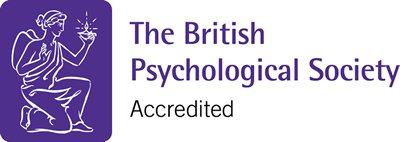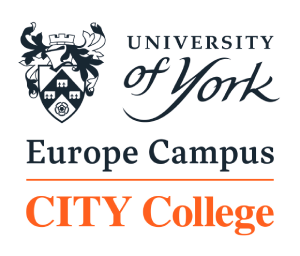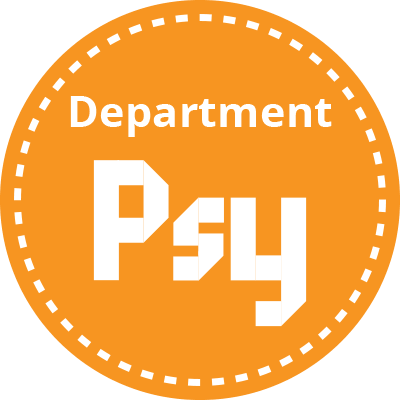Psychology - BSc (Hons)


Course duration: 3 years
Degree Title: Successful graduates are awarded the undergraduate degree of the University of York.
Bachelor of Science (Honours) in Psychology
The title is awarded directly by the University of York.
The degree is recognised by UK ENIC.
 Accredited by the British Psychological Society (BPS)
Accredited by the British Psychological Society (BPS)
The programme is accredited by the British Psychological Society (BPS).
Fees (Scholarships)
We encourage you to take advantage of our Scholarships scheme to save on tuition fees and secure your spot.
For more information, please fill in the form above or call us at (+30) 2310-224026.
The Programme
Psychology is concerned with a wide range of phenomena including remembering and forgetting, thinking, problem solving, learning, the acquisition of skills, language, seeing and hearing, decision making, verbal and non-verbal communication, social interactions, and emotions. It is also concerned with the practical and ethical applications of psychological research to the profession.
The specific knowledge base imparted in the program consists of:
- psychological foundations
- current basic and applied research findings
- knowledge and respect for diverse cultures and individual differences
- clinical intervention and problem-solving skills, including preventive interventions to introduce students to the practice of research methods in behavioural sciences.
- principles of ethical professional practice
- skills in statistics and research methodologies and test construction
- facility in utilising resources
- professional psychological practice
- an understanding of the legal and regulatory contexts in which psychological services are provided
- understanding of the environmental contexts that impact on individuals and groups and skill in working effectively with those systems.
Accredited by the British Psychological Society - BPS
The programme is accredited by the British Psychological Society (BPS)

Why choose this course?
-
Degree from one of the world’s top universities, the University of York.
-
Access to a variety of career paths: Graduates may pursue careers as educational, counseling, sport, forensic, clinical, occupational, health and work in many different settings such as hospitals, community centres, schools, businesses and many more.
-
BPS membership.
Graduates who have completed the course are eligible to become members of the British Psychology Society (BPS) and take advantage of the numerous benefits of BPS membership (i.e. global recognition, networking, access to BPS literature, high standards in professional practice, legal support and many more).
-
Emphasis on applied knowledge, through class activities and innovative assessment such as diaries and case studies, hands-on sessions in the Neuroscience Lab and many more, helping students combine theory and practice.
-
Opportunities to participate in departmental research and civic engagement projects and volunteering activities.
-
Opens doors to postgraduate studies in Greece and abroad.
- Events with well-recognised academics and practitioners.
More reasons why:
-
Supportive learning environment with a wide range of support services available to students.
Student Services
-
Free participation in sports and clubs activities.
Sports@CITY | Clubs
-
Our state of the art library, the Information and Learning Commons (ILC) fully supports our students’ study experience.
Our state of the art Library
- Participation in events, seminars and workshops by successful professionals who share their expertise with students.















Stage 1
- Evolutionary Psychology
- Academic English Skills
- Discovering Science
- Introduction to Psychology
- Topics in Psychology
- Computing Skills for Psychologists
- Applied Psychology
- Reasoning & Critical Thinking for Psychologists
- Sensation & Perception
- Philosophy, Science and Ethics
Stage 2
- Neuroscience
- Individual Differences
- Child Development
- Social Psychology
- Psychological Disorders
- Memory and Language
- Psychological Research Methods
- Statistics
- Health Psychology
- Psychology of Employment, Employability and Enterprise
- Contemporary Issues in Educational Psychology
- Forensic Psychology
Stage 3
- Minorities: Understanding Diversity and Inclusion
- Cognitive Neuropsychology
- Psychology of Counselling
- Psychology of Addiction
- Adult Development and Aging
- Emotion from an Interdisciplinary Perspective
- Issues in Clinical Psychology
- Cognition & Emotion
- Social Cognition and Behaviour
- The Psychology of the Intimate Interpersonal Relationship
- The Psychology Graduate: Professional Development & Employability
- Research Project in Psychology
Stage 1
Evolutionary Psychology
This unit is devoted to examining the ways in which the growing, influential and promising field of evolutionary psychology can shed light on the nature of the human mind and behaviour. The unit begins with an introduction to evolutionary theory and a discussion of some foundational issues concerning its nature and structure. The purpose of this unit is also to introduce a different way of thinking about behaviour in terms of its adaptive significance. Finally, implications of the evolutionary psychology approach for the mainstream academic fields of psychology - cognitive, social, developmental, clinical, personality psychology - are considered. ![]()
Academic English Skills
This unit instructs students in all aspects of academic communication including writing, reading, speaking and listening as well as offering opportunities for vocabulary enrichment and lexical and structural improvement specific to academic communication. The unit also provides space for students to consider how technology is used in the academic communication process. Using a variety of different teaching and learning methods students will be given the opportunity to practice and improve their overall use of academic English so that by the end of the course they are proficient in the specifics of academic discourse appropriate to their field of study. This unit acts as a support mechanism to the linguistic demands expected of students in their core subjects i.e. Computer Science, Business or Psychology. The unit seeks to improve overall language use through contemporary issues that relate to the role of the individual in contemporary society, as well as those pertinent to the student’s own field of study. ![]()
Discovering Science
The unit is an introduction to science for psychology students in their first level. Specifically, the unit explores the methods, techniques and reasoning skills that underpin the science of psychology. Part of this unit will entail practical laboratory classes that will assist students in discovering the scientific methodology and basic techniques for conducting research. The unit will assist students in discovering research in a wide range of disciplines in psychology such as cognitive, social, developmental psychology and neuroscience. It will encourage students to participate in experimental and non-experimental designs commonly practiced in psychology. In addition, students will be involved in research exercises that will increase their understanding of scientific methodology in psychology. ![]()
Introduction to Psychology
This unit introduces students to the foundations of psychological science as well as the historical roots and the potential future directions of the discipline. Key areas include research methodology and history of psychology, evolutionary and genetic influences on behaviour, neuroscience, sensory and perceptual processes, human memory and thought. The discussion of both traditional approaches and current trends in psychological inquiry during the lectures will allow students to expand their knowledge and comprehension of psychology. Students will also attend several seminars that will enhance their academic, writing, and critical thinking skills, and have the opportunity to participate in classroom discussion on emerging psychology topics. ![]()
Topics in Psychology
This unit will provide an overview of key areas of psychological research, including cognitive functions and higher order mental processes, developmental processes, social interaction, consciousness, individual difference and mental disorders. Traditional approaches and current trends in psychological inquiry will be discussed, and this will allow students to expand their knowledge and comprehension of psychology during the formal lectures. Students will also attend several seminars that will enhance their academic, writing, and critical thinking skills, and have the opportunity to participate in classroom discussion on emerging psychology topics. ![]()
Computing Skills for Psychologists
The computer and the Internet are key tools employed by contemporary psychologists to accomplish a multitude of demanding tasks, such as reliable research, efficient communications, and effective time-management. This unit will provide an overview and understanding of the role and use of computers in our society. Furthermore, students will get familiar with time management methods via ICT tools. Focus is placed on evaluating the information found on the Internet. Students will also be presented with the appropriate tools for the electronic production of online documents, the means for building online effective presentations, and tools for web page development. Finally, Revision Session (2 hours each) aims at the revision of material taught and preparation of students for the third piece of coursework. ![]()
Applied Psychology
This unit studies the processes involved in the adjustment of individuals to their personal and social environments. Emphasis will be placed upon developing understanding and skills in the areas of interpersonal relations and psychological and physical well-being. Topics include: Adjustment, Personality, Self-concept, Self-esteem, Self-efficacy, Self-regulation, Coping processes, Interpersonal communication, Interpersonal conflict, Friendship and Love and Marriage and Intimate relationships. Applications include: improving academic performance, achieving self-control (behaviour modification), building self-esteem, developing an assertive communication style, and understanding intimate violence. ![]()
Reasoning & Critical Thinking for psychologists
Once formed, beliefs and cognitive biases remain intact, despite any contradictory evidence suggesting the opposite. This course will present a number of erroneous beliefs about human behaviour and other misconceptions, in order to encourage students to develop a healthy scepticism and critical thinking skills. The common sources of knowledge, that lead people to believe in something but not something else, will be explored and contrasted to the scientific method, and for distinguishing between scientific and pseudo-scientific arguments. Among the themes that will be discussed are pseudo-sciences, controversial treatment methods and assessment techniques urban legends etc. Students will have the opportunity to work in groups and present a debate on a related topic of their choice. ![]()
Sensation & Perception
The unit will introduce students to mechanisms of sensation and perception in humans and other animals. In the first lectures we will consider the philosophical and scientific questions that humans have long posed about perception, and study the methods and techniques scientists use to try to answer them. We will study the sensory pathways and fundamental perceptual processing including visual illusions and ambiguous figures in object perception. We will cover skin senses, chemical senses (smell and taste), audition and vision. Finally, we will study sensation and perception from physiological psychological and ecological perspectives. The course will be partly run in lectures but also using hands-on activities and exercises to allow first level students to understand the theoretical concepts. There will be two assignments (50%) and a final exam (50%). ![]()
Philosophy, Science and Ethics
This unit will introduce students to the historical foundations, methods and implications of scientific research in society, as well as the ethics of scientific research, with special emphasis in the field of Psychology. The unit's basic topics will be the philosophical foundations of the scientific method; what exactly is science and how scientific explanation works; what is scientific data, its reliability, its ecological validity and its restrictions. Furthermore, the unit will deal with ethics throughout the development of science and the ethical issues that arose during this process. ![]()
Stage 2
Neuroscience
This course will provide fundamental knowledge of the structure and function of the human nervous system. It will equip students with the most important concepts and principles of modern neuroscience and demonstrate how cellular biology, brain structure and function are linked to human cognition and behaviour. ![]()
Individual Differences
This unit introduces students to individual differences in personality, intelligence, and social beliefs and the methods for the assessment of such differences. It incorporates current research trends, the theories and the findings, as well as the research methodology and ethics employed in the context of individual differences. ![]()
Child Development
This unit introduces students to the nature of behavioural, perceptual, emotional, cognitive, social, motor, and moral child development, by presenting a variety of up-dated studies and reading material that is consolidated through tutorials and written assignments. The students will learn to review these topics critically and to expand their knowledge, comprehension, analytical, and evaluation skills by drawing on the information that is presented to them during the formal 2-hour lectures. The achievement of the learning outcome is measured through one class test and a final two-hour examination. ![]()
Social Psychology
Social psychology’s big ideas rest on the principles that people do not live their life in a vacuum; rather they are social beings who interact with others, communicate, share emotions, and exchange ideas on a daily basis. This unit will explore some of the most fundamental questions in social psychological research including the way people understand themselves in social contexts, what breeds prejudice and conflict, and what makes some people more susceptible to persuasion attempts that others. ![]()
Psychological Disorders
This unit covers in detail a range of disorders listed in current classification systems. It initially introduces students to the dominant etiological and treatment models. It subsequently discusses one group of disorders at a time, with emphasis on typical symptoms and associated features, classification, epidemiology, and treatment. This allows students to acquire both theoretical understanding of the disorders as well as knowledge of diagnosis, classification and possible interventions for different psychopathological conditions. At relevant points, it focuses on current discussions and debates regarding selected psychopathological phenomena, providing, thus, more specialised and in-depth knowledge of specific issues. ![]()
Contemporary Issues in Educational Psychology
this unit critically examines the role of the educational psychologist and explores the relationship between theory and practice within the educational system, placing emphasis mainly on early intervention. the students will learn to review these topics critically and to expand their knowledge, comprehension, analytical, and evaluation skills by drawing on the information that is presented to them during the formal 2-hour lectures. the achievement of the learning outcome is measured through one tutorial essay and a final two-hour examination. ![]()
Forensic Psychology
The purpose of this unit is to provide students with knowledge and understanding of the main concepts of Forensic Psychology and Criminal Investigation. The students will learn about the fundamental psychological theories of crime and how they are applied in criminal behaviour through case studies. Students will be asked to be actively involved in understanding criminal behaviour and on how a psychologist may participate in the legal systems’ procedures. ![]()
Psychological Research Methods
Research Methods is an introduction to the process and practice of research in the behavioural sciences, with particular attention to the opportunities and challenges that psychologists face in applying the methods of science to the study of human behaviour. ![]()
Statistics
Statistics is an intermediate course to statistical analysis using inferential methods. The unit will provide students with the skills necessary to analyse quantitative and categorical data obtained in empirical research. ![]()
Health Psychology
This unit is a theoretical introduction to the role of psychological processes involved in health and illness. It provides students with the foundation understanding of the practical implications of Health Psychology. Focus will be given on lifestyle diseases (obesity, smoking, stress, etc.) and terminal illness, as well as ethical issues involved in Health Psychology. It further provides a thorough discussion of the role of health beliefs in peoples’ behaviour and evaluation of the effectiveness of health care systems, as well as of specific intervention strategies. ![]()
Psychology of Employment, Employability and Enterprise
Every day people spend much of their precious time at work. Some employees work only in the morning, while others change between day and night shifts. Others are concerned with managing their time between family issues and everyday job demands. On the other hand, organizations seek to find employees motivated to cooperate with their leaders and put effort to achieve organizational goals. The existing financial crisis has led to layoffs across Europe, and employees seeking new employment opportunities are often concerned about employability, entrepreneurship, and lifelong learning issues. In short, the workplace is an ecosystem, an arena of dynamic interaction between people, and employment emerges as an important issue in both developed and developing countries. Psychologists play an important role as they are often called to resolve workplace matters by applying the science of psychology at work. This unit concerns research and the applications of psychology in the industry, business, and organisations, and the main themes covered relate to occupational stress and well-being at work, values and personality in the workplace, employee motivation and performance, as well as the social context of work. ![]()
Memory and Language
This unit provides an overview of information processing approaches to the study of language, memory and thought. It illustrates the way research in different branches of psychology has been brought to bear on these cognitive processes. The main concepts of all three areas are introduced and their interrelation is displayed. Different approaches of investigating human cognition are presented and theories of all three cognitive activities are demonstrated and critically discussed. ![]()
Stage 3
Minorities: Understanding Diversity and Inclusion
This module will examine key issues, theories and research concerning socially vulnerable groups with regards to minority rights and psychosocial support. The relationships between nationalism, citizenship and minority rights will be considered with reference to empirical examples and contemporary research. The module will focus upon a broad range of challenging questions for respecting difference within a globally complex and interconnected world by discussing contemporary minority issues such as immigration, the refugee crisis, women’s rights and LGTB rights. ![]()
Cognitive Neuropsychology
The initial lectures will introduce the discipline and methods of cognitive neuropsychology, with a special emphasis on key aspects, such as transparency and single-case vs. group studies. Then the major neuropsychological disorders will be discussed: agnosias (object recognition), prosopagnosia (face processing), disorders of memory, neglect, dyslexia, and frontal lobe syndrome, disorders of language and lateralization. ![]()
Psychology of Counselling
The unit introduces students to counselling psychology as a profession. It covers both the main theories and schools that underpin counselling psychology and the key areas of intervention in the discipline. Moreover, it provides a basis for the development, understanding and application of key skills in counselling, while it engages with cultural, ethical and professional issues that inform the practice of counselling psychology. ![]()
Psychology of Addiction
The core concept of the unit is addiction and the psychological processes that determine this phenomenon. Initially, addiction will be defined and described, on the basis of its characteristics, risk and vulnerability factors. Also, psychoanalytic, cognitive, social and other types of approaches of addiction and its dimensions there will be introduced. Moreover, the role of the family system in the initiation, maintenance and treatment of addiction there will be presented. However, addiction will be approached as a behaviour pattern in terms of other fields as well, such as internet addiction and gambling and the relation between addiction, comorbidity and criminality. The completion of the unit will be accomplished after the presentation of the basic principles of addiction treatment and the different types of prevention and treatment programs. ![]()
Adult Development and Aging
The demographic change into an aging population is a global phenomenon and at the same time a social challenge. This has resulted in a growing interest among researchers, psychologists and policy makers in understanding the process of aging, and in fostering health and active lifestyles in older age. This unit provides an introduction to the multidisciplinary field of adult development, with an emphasis on the psychological theories of aging. ![]()
Emotion from an Interdisciplinary Perspective
This unit will introduce a range of approaches, both theoretical and applied, to the topic of emotion from different perspectives such as neuropsychology, developmental, clinical, counselling, social and forensic psychology. Students will be provided with examples about the diversity of questions and methods used, as well as note the common ground that emerges in this diversity. The topics coverage will range from the neural bases of particular emotions to the role of emotion in counselling/psychotherapy. ![]()
Issues in Clinical Psychology
This unit provides students with knowledge and understanding of the main issues entailed in Clinical Psychology. The main focus will be placed upon the different issues of Abnormality with an emphasis on the clinician-client relationship, personality disorders, human sexuality, as well as legal and ethical issues in Clinical Psychology. The unit is delivered in a formal lecture mode; however, critical participation of the students will be encouraged through case studies, exercises, and/or role playing through which the theoretical parts will be displayed practically. ![]()
Cognition and Emotion
The unit will consider how emotion affects the following processes: conscious and non-conscious processing; memory bias and memory deficits; attentional bias; schematic processing; judgments; thoughts and images. The unit aims to equip students with knowledge and understanding of the interaction between cognitive and emotional processes; (e.g., mood and persuasion) as well as the ability to assess the degree to which information-processing models of anxiety and depression are able to account for extant studies. ![]()
Social Cognition and Behaviour
This unit will provide an in-depth analysis of contemporary topics in social cognition, by focusing on experimental and non-experimental research from social psychology. Decision-making models, normative influences on behaviour, as well as implicit social cognition and automatically activated processes and behavioural responses will be discussed. The unit will present state-of-the art research in social cognition and related topics, as well as advances and current trends in social psychological theories and paradigms. ![]()
The Psychology of the Intimate Interpersonal Relationship
This unit will present major theories and research on intimate relationships. More specifically it will examine theories and research regarding the development, maintenance, and breakdown of intimate relationships with emphasis upon the social factors underlying these processes. It will also present the biological, emotional and social bases of sexuality, sexual orientation, and intimacy. Finally, the course will also provide basic knowledge regarding practical applications of theories in couple therapy. ![]()
The Psychology Graduate: Professional Development & Employability
You're close to getting your degree in Psychology, but what does this really mean? Will you become a therapist, an academic, or choose a totally different career path? In this unit you will become aware of the knowledge and skills you have acquired throughout your studies, explore the concept of employability, self-assess your own employability status, and further discuss employment opportunities for psychology graduates. This unit aims to better prepare you for the challenges, the risks and opportunities of the constantly changing global market. ![]()
Research Project in Psychology
The purpose of this unit is to provide students with an opportunity to develop an independent research project on a particular topic of their choice. Students will determine an appropriate topic for research, review the literature on the subject, recruit participants, collect and analyse data, report the results in the form of an APA-style paper, and make conclusions and recommendations for future research. This procedure will allow students to demonstrate their knowledge about the scientific enterprise and their ability to critically use literature and issues arising within the specific topic. ![]()
Entry requirements
View the application and admission requirements of the programme.
How to apply
If you wish to apply for this programme you may view details of the application process.
Any questions?
If you'd like to know more about this programme, contact our Admissions Team at
admissions
The Psychology Department of CITY College, University of York Europe Campus has excellent reputation due to the high quality of teaching and research. Our academic staff is strongly committed to excellence in research and in teaching at both undergraduate and postgraduate level. Teaching is informed by the latest scientific research and cultivates development of critical thinking, self-development, and academic and professional ethos. Most of the department’s academic staff hold a PhD degree, have intensive research activity and significant professional experience. The department’s practitioners hold equivalent professional qualifications.
More about the Psychology Department

BACP Organisational Membership
The Psychology Department of CITY College is Organisational Member of the British Association for Counselling and Psychotherapy (BACP).
Research at the Psychology Department
Recognition and Careers
Accreditation and Recognition
CITY College is strongly committed to quality education and academic excellence. It is officially accredited and recognised by top international accreditation bodies. Read more
Degree and formal qualifications
The degree and formal qualifications our graduates receive.
For Greek graduates only: Recognition of degrees
Our Psychology graduates can register to the HCPC and officially receive the title of Practitioner Psychologist in the UK
Our Graduates of Bachelor in Psychology who continued their studies to Masters level and have been awarded our MSc in Counselling Psychology (along with adequate practical experience in a related field) or our MA in Counselling Psychology, can apply for registration to the Health and Care Professions Council – HCPC through the International route and may also acquire the Europsy certificate in Psychology, by the European Federation of Psychologists Associations (EFPA). Read more
Career opportunities
Graduates of the BSc (Hons) in Psychology programme may pursue careers in a variety of professions that involve working with people. They can pursue careers as psychologists, counsellors, social workers in hospitals, community centres, schools, businesses and many more.
Career, Employability and Enterprise Centre
The Career, Employability and Enterprise Centre, focuses on helping students to set attainable career goals. It offers advice on CVs and cover letters, and on how to effectively handle job interviews. Through career fairs, and different internship programmes, the department aims at constantly bringing students in contact with prospective employers.
Every spring we organize the Annual Career Fair presenting with an opportunity to get a first feel of job seeking. During the event students and alumni have interview opportunities with corporate recruiters and present their skills and abilities to potential employers. Large companies, organisations and multinationals from different industries across S.E. Europe participate every year in our Career Fair and offer employment and internship opportunities to our students and graduates.
More about our Career Services.
Contact the Career, Employability and Enterprise Centre at careers@york.citycollege.eu
Your Career Journey


A journey to personal and professional development designed to maximise university experience and prepare students for a fulfilling career.
British Psychological Society (BPS)

The programme is accredited by the British Psychological Society (BPS).
Our Psychology BSc graduates are eligible to seek graduate membership (MBPsS) of the British Psychological Society (BPS).
Extensively experienced and highly qualified, all staff members are committed to delivering our programmes in line with the UK standards of quality and at the same time they facilitate and sustain a critical engagement, with an insight and a broader perspective incorporated in all learning, teaching and assessment methods.

“I am really proud to be part of the particular team of people. Highly skilled and with diverse specialties they are primarily focused on our students and their development. With an authentic interest in people and an inclusive attitude, we can make all of our students succeed and thrive in any highly demanding environment.”
Dr. Suzie Savvidou
Head of the Psychology Department
The academic staff & administration staff of the Psychology Department









